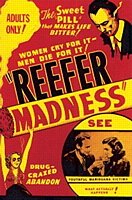Cannabis & Later Psychosis: The Lancet Meta-analysis

A new meta-analysis published in British medical journal, The Lancet, argues that the use of cannabis is not at all an innocent pleasure. Rather, in a review of the combined results of 35 population-based longitudinal observational studies of the relationship between the use of cannabis and psychiatric disorders in later life, the authors found an overall increased risk of 41% in the development of any psychosis among individuals who had used marijuana in the past. The summary of their findings reports:
These results were so persuasive that the editors of The Lancet editorialized as follows:There was an increased risk of any psychotic outcome in individuals who had ever used cannabis (pooled adjusted odds ratio=1·41, 95% CI 1·20–1·65). Findings were consistent with a dose-response eff ect, with greater risk in people who used cannabis most frequently (2·09, 1·54–2·84). Results of analyses restricted to studies of more clinically relevant psychotic disorders were similar. Depression, suicidal thoughts, and anxiety outcomes were examined separately. Findings for these outcomes were less consistent, and fewer attempts were made to address non-causal explanations, than for psychosis. A substantial confounding effect was present for both psychotic and affective outcomes.
So, has the question been settled? Is it clear that marijuana is a dangerous drug which can cause irreparable harm to its users? It would be stretching the scientific arguments advanced by Moore and her colleagues (2007) to use this study's findings as having settled this question in a definitive way. My reactions to this article include these thoughts:In 1995, we began a Lancet editorial with the since much-quoted words: “The smoking of cannabis, even long term, is not harmful to health.” Research published since 1995, including Moore's systematic review in this issue, leads us now to conclude that cannabis use could increase the risk of psychotic illness. ("Rehashing the evidence...," 2007)
- It is likely that using marijuana increases the risk of psychotic illness in later life for some small percentage of the population. And, since psychotic illness can be quite debilitating and tends to follow a chronic course, the danger may be substantial that some marijuana users are putting their later life in real jeopardy.
- Correlation, as our basic research theories tell us, can never prove causation. All of the studies examined by Moore et al. (2007) were correlational in nature. Further, the additional use of meta-analytic grouping techniques cannot turn correlational data into experimental data no matter how sophisticated the statistics. This means that, while the trends and the thrust of the data seems to make marijuana a very promising explanatory causal factor in the development of some of the psychoses that these research participants developed, such a link has not been conclusively demonstrated. And, while the gross odds ratio speaks of a 41% increased risk, the authors themselves acknowledge the impact of confounding and other variables in lowering the risk percentage in the studies they examined. Hence, we are left without a good estimate of what the actual increased risk might be.
- This last point is related to a fundamental set of questions about causality in the area of drug risk research. The primary question concerns how much the decision to use marijuana (in earlier life) and the development of a psychotic illness (in later life) might BOTH be causally related to an underlying third factor. Might it be possible that there is a genetic determinant or a genetic x environmental interactive determinant that could explain a large proportion of the relationship identified in this study? Alternatively, since we know that psychosis tends to emerge in adulthood rather than adolescence, might it be possible that pre-psychotic adolescents might be "self-medicating" or using marijuana to ward off their sense of an increasingly unstable or deteriorating psychological state and this would then serve to explain the sequence of drug use preceeding the appearance of tangible psychotic symptoms? Such questions demand further study.
Press release: Cannabis could increase risk of psychotic illness in later life by over 40 percent [Press release]. (2007, July 26). EurekAlert!.
References
Nordentoft, M., & Hjorthøj, C. (2007, July 28-August 3). Cannabis use and risk of psychosis later in life. The Lancet, 370, 293-294. (Commentary)
Rehashing the evidence on psychosis and cannabis [Editorial]. (2007, July 28-August 3). The Lancet, 370, 292.
====================
Update 7/30/07 11:30 pm
A respondent to Andrew Sullivan's excellent blog has posted a detailed argument why cannabis is not congenial to the mental health of many of its users. I found the posting persuasive and have posted a link to it here.